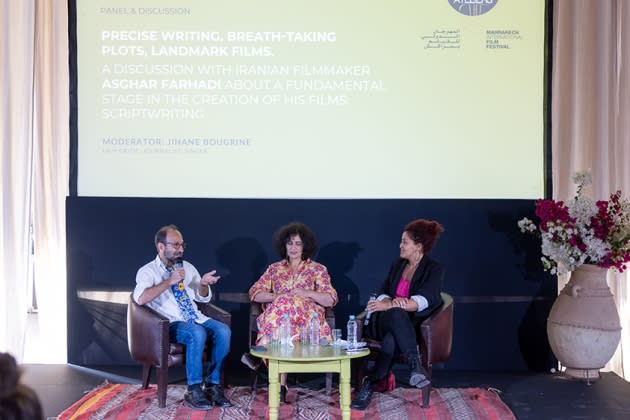‘A Separation’ Director Asghar Farhadi on the Delicate Art of Screenwriting, Being Local, Universal Sentiments
- Oops!Something went wrong.Please try again later.
- Oops!Something went wrong.Please try again later.

MARRAKECH – Compassion, understanding, not taking characters at face value. These are all philosophies that inform Iranian director Asghar Farhadi’s sage, humanistic approach to drawing his characters, as discussed on stage Tuesday at the Atlas Workshops’ (14-17 November), the Marrakech Film Festival’s project, talent-and-mentoring forum.
For 75 minutes, Farhadi, the winner of this year’s Cannes Grand Prix for “A Hero” and one of Iran’s most acclaimed filmmakers, spoke about his what seems a unique approach to the art of script-writing; about how he draws characters, develops his scripts and whom he trusts to vet his ideas.
More from Variety
Arab World Independent Film Distribution Broken Down at Atlas Workshops
Marrakech VP Faïçal Laraïchi on Two Decades of Glamour and Ever More Emerging Talent
Director Cristèle Alves Meira On Portugal's Oscar Entry 'Alma Viva'
“I have a couple of people around me who are my first advisors. I share it with them. It’s not the advice they will give me but the look. The spark in their eyes,” he said.
A regular at top international festivals, Farhadi has won an Academy Award for international feature film for both “A Separation” and the drama/thriller “The Salesman.” “The Salesman” also won best screenplay at Cannes.
Between showing and walking the audience through excerpts from some of his recent films, he discussed not taking events at face value.
“Something I have observed in life, when we see someone committing an act, we think they should be punished. No one looks back to see what micro event has triggered a series of events that lead to that situation,” he said.
Farhadi teaches filmmaking. His philosophy is go local to hit global.
“When I teach in Iran and my students ask if they should make the trailer in English, I say, ‘No do it in Farsi, because if it’s authentically local then it will work universally.’ Through your work of art it will become global or not.”
Not everyone agrees with him, however. “When I give the scenario to my team they say: ‘Why do I want to make a film that’s so specifically Iranian?’” he said.
Fielding questions from filmmakers attending the three-day program, Farhadi offered up his philosophies on life and films.
“Love is, in my opinion, the same everywhere. All stories are based on love and hate. We might express it differently but we all feel it the same. It’s international,” he said.
How does he place his stories in different settings? “I don’t think it makes sense to think people are different because of their beliefs or nationality. It’s to find similarities,” he added.
As for everyday people: “Heroes are simple people ending up in a complicated and cruel situations. Unfortunately it’s our reality,” he said.
When are people at their worst, in his opinion?
“My existential experience shows me that lies are thrown out more through reactions,” he said. “It’s rare to have a person plan how they will take a position. My characters lie more in reaction than action.”
So his films, he says, differ from the norm in terms of judging characters.
“In cliched cinema, we would find a character that is bad, that isn’t forgiven because we can’t develop empathy for them because we don’t have enough information about them,” he said.
Why does he make films? “There are questions of morality and I don’t have the answer, which is why I’m making films to explore these big issues. Why do we die? Live? These are questions I have and try to explore through my films,” he said. “Who is right? What is the truth? I don’t have the answer. Especially in these times, there is such a huge flow of information. We think it helps facilitate making a decision and deciding between right and wrong, but it’s not true. This saturation of information makes it even more difficult.”
“Trends say that we should make movies between good and bad people,” he continued. “In my films, I see there is a distinction between the good and the good. It’s not about believing that everyone’s good. But if we take time, and leave time to people, we won’t say they are right or wrong but we will eventually try to understand them.”
The Marrakech Film Festival runs Nov. 11-19.
Best of Variety
Sign up for Variety’s Newsletter. For the latest news, follow us on Facebook, Twitter, and Instagram.
